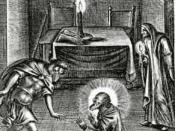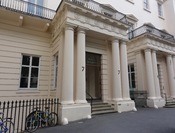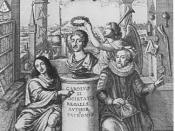Traditionally historians have argued that there was a direct rivalry between science and magic, but science and magic were not incompatible and arguably largely merged. It is natural for historians of science, with an inherent belief in the strength science, to describe the path of science as one of success and overcoming of rivals. In this way science has often been portrayed as the victor over magic, with this seen as a victory for reason over ignorance. A closer look at the historical context reveals that during a thirty year period, in which the Royal Society and the new science were establishing themselves, there was no unanimity of opinion. Science was not the destroyer of medicine; rather it was the changes in theological perceptions from the 1740s onwards.
There could be a perceived conflict between these two disciplines due to their differences in knowledge base and the differences between them in modern society.
Magic has regularly been described as the areas of science which went beyond the socially accepted norms, either in the present or past. This would generate a natural conflict between rational science and irrational magic due to misleading definitions. In modern society magic is often seen in this way, but this is an example of domesticating the past. This generates a misleading impression because magic was not perceived in this way in early modern Europe. Magic was an accepted part of early modern society, and was no more or less accepted than science.
Science and magic differed in where the knowledge was obtained from. Science was taught through education and was formal in its basis, whereas magic took advantage of the development of print to spread knowledge. The literacy rate was fairly high in Western Europe and this meant that suddenly knowledge was available to masses of...


